
 |
||||||
|
GAY
FILM REVIEWS BY MICHAEL D. KLEMM
|
||||||
|
Ciao Here!
Films, Director: Screnplay: Starring: Rated R, 87 minutes |
A
Beautiful Friendship
The camera sits just outside of the door to a bedroom. In one long and unbroken shot, a young man stares at the unmade bed, fondles a cowboy hat and, finally, picks up a guitar that leans against the wall and tentatively strums a few chords. His name is Jeff and he has just lost his best friend, Mark. This early scene, typical of the film's lovely low-key approach, is executed with the simplicity of a Haiku. The man's grief is beautifully conveyed without resorting to pull-at-the-heartstrings music or histrionic displays of emotion. |
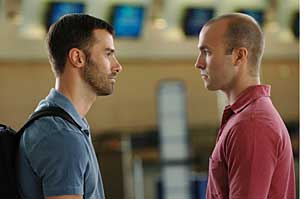 Ciao
(2008) is a superb new film about friendship, loss, closure and new beginnings.
Jeff, a 30-something gay man played by Adam Neal Smith, is mourning his
friend's passing. He has been checking Mark's e-mails and writing people
back as needed to relay the bad news. He finds an e-mail from an Italian
man named Andrea (Alessandro Calza). Andrea has written to tell Mark that
he is arriving from Italy in a few days to attend a friend's wedding and
that he is looking forward to finally meeting in person. Jeff writes back
to Andrea to break the news, and is moved by this stranger's devastated
response. Upon discovering a lengthy online correspondence between the two
men, Jeff learns how close they'd become. He invites Andrea to follow through
with his original plans and come stay with him. Ciao
(2008) is a superb new film about friendship, loss, closure and new beginnings.
Jeff, a 30-something gay man played by Adam Neal Smith, is mourning his
friend's passing. He has been checking Mark's e-mails and writing people
back as needed to relay the bad news. He finds an e-mail from an Italian
man named Andrea (Alessandro Calza). Andrea has written to tell Mark that
he is arriving from Italy in a few days to attend a friend's wedding and
that he is looking forward to finally meeting in person. Jeff writes back
to Andrea to break the news, and is moved by this stranger's devastated
response. Upon discovering a lengthy online correspondence between the two
men, Jeff learns how close they'd become. He invites Andrea to follow through
with his original plans and come stay with him. |
|
|
|
|
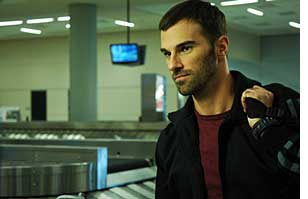 Andrea
is a smolderingly attractive man with a groomed stubble beard and a killer
smile. Both men are easy on the eyes; they turn a glance or two in the other's
direction as they wait for Andrea's luggage but they seem more interested
in talking about Mark than in checking each other out. They click immediately
and obviously enjoy each other's company but their absent friend dominates
their thoughts. Conversations will turn into confessionals. They also talk
about themselves, and where they're from. There's smalltalk and a few language
games too; Jeff lives in Dallas, Texas and he teaches Andrea how to say
"y'all." But, never for a moment, do you think this is going to slide into
Tom Hanks Meg Ryan hell. This is NOT You've Got Mail or its ilk.
And that's a good thing. Andrea
is a smolderingly attractive man with a groomed stubble beard and a killer
smile. Both men are easy on the eyes; they turn a glance or two in the other's
direction as they wait for Andrea's luggage but they seem more interested
in talking about Mark than in checking each other out. They click immediately
and obviously enjoy each other's company but their absent friend dominates
their thoughts. Conversations will turn into confessionals. They also talk
about themselves, and where they're from. There's smalltalk and a few language
games too; Jeff lives in Dallas, Texas and he teaches Andrea how to say
"y'all." But, never for a moment, do you think this is going to slide into
Tom Hanks Meg Ryan hell. This is NOT You've Got Mail or its ilk.
And that's a good thing. |
|
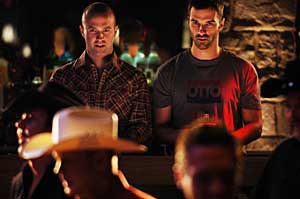 Ciao
is a wonderful example of what can happen when a filmmaker works outside
the box. The story's seed grew from an e-mail correspondence between director
Yen Tan and star Alessandro
Calza. Ciao was originally conceived
as a fluffy, romantic comedy until the director and co-writer decided to
jettison all of the usual cliched cinematic conventions and make a more
honest and realistic film. It has the depth, and the feel, of one of Bergman's
chamber movies while retaining a sense of humor. Ciao
doesn't follow any formulas. Expect the unexpected. For example: Mark wanted
to teach both of them to line dance - and they both hate country & western
music. Will they fall in love as they clumsily learn how to hoedown? No;
although they do watch a group of men line dance in Mark's favorite
bar without participating themselves. In another scene they find a 1980s
arcade video game that belonged to Mark and start to play it like two teenagers.
Both look at one of Mark's paintings and agree that their friend wasn't
very good at it, and that they both lied to him and encouraged him. Ciao
is a wonderful example of what can happen when a filmmaker works outside
the box. The story's seed grew from an e-mail correspondence between director
Yen Tan and star Alessandro
Calza. Ciao was originally conceived
as a fluffy, romantic comedy until the director and co-writer decided to
jettison all of the usual cliched cinematic conventions and make a more
honest and realistic film. It has the depth, and the feel, of one of Bergman's
chamber movies while retaining a sense of humor. Ciao
doesn't follow any formulas. Expect the unexpected. For example: Mark wanted
to teach both of them to line dance - and they both hate country & western
music. Will they fall in love as they clumsily learn how to hoedown? No;
although they do watch a group of men line dance in Mark's favorite
bar without participating themselves. In another scene they find a 1980s
arcade video game that belonged to Mark and start to play it like two teenagers.
Both look at one of Mark's paintings and agree that their friend wasn't
very good at it, and that they both lied to him and encouraged him. |
|
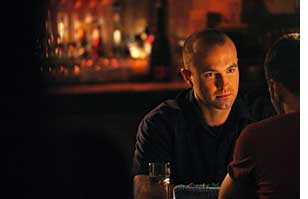 Shared
grief can often be the basis of a new relationship. Each is able to tell
the other something new, or that they needed to hear, about their friend
and this helps them to heal. One gets the impression that both men wanted
more than just friendship with Mark, and they can only contemplate what
could have been. Andrea is surprised that Jeff and Mark weren't lovers
or life partners (they shared one drunken night together) and Jeff explains
that he wasn't Mark's type. When asked what was his type, Jeff says,
"Oh, someone more exotic looking, preferably a foreigner. Maybe an Italian." Shared
grief can often be the basis of a new relationship. Each is able to tell
the other something new, or that they needed to hear, about their friend
and this helps them to heal. One gets the impression that both men wanted
more than just friendship with Mark, and they can only contemplate what
could have been. Andrea is surprised that Jeff and Mark weren't lovers
or life partners (they shared one drunken night together) and Jeff explains
that he wasn't Mark's type. When asked what was his type, Jeff says,
"Oh, someone more exotic looking, preferably a foreigner. Maybe an Italian." |
|
 There
was so much that I liked about this film. For starters, I'm grateful that
this didn't turn into a paint-by-numbers love story; there are so
many of those already out there. Did I want these guys to fall for each
other? I suppose I wanted them to at least have sex once. I already knew
that they would because of the picture on the DVD cover. These guys are
attracted to each other but they form a much deeper bond and that makes
the film more interesting. Even so, when they finally do get intimate,
Tan's minimalist approach delivers one of the most moving and nurturing
scenes of two men coming together ever filmed. There
was so much that I liked about this film. For starters, I'm grateful that
this didn't turn into a paint-by-numbers love story; there are so
many of those already out there. Did I want these guys to fall for each
other? I suppose I wanted them to at least have sex once. I already knew
that they would because of the picture on the DVD cover. These guys are
attracted to each other but they form a much deeper bond and that makes
the film more interesting. Even so, when they finally do get intimate,
Tan's minimalist approach delivers one of the most moving and nurturing
scenes of two men coming together ever filmed. |
|
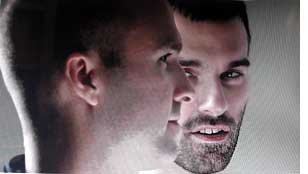 The
photography and the offbeat pacing bear mentioning. Conventional techniques
like alternating over-the-shoulder shots are utilized in many of the dialogue
scenes but director Tan also likes to capture moments (like the love scene)
in one unbroken shot. This approach might scream "art film" to some, but
his methods are proper. His 2002 film, Happy
Birthday, was also a small masterpiece of minimalism and
Tan clearly understands the concept of "less is more." He likes corridor
shots and scenes filmed through doorways for painterly compositions that
exploit negative space. Blackouts punctuate the narrative. The piano music,
often consisting of only a couple notes, is almost unnoticeable and many
scenes also play out in silence. The closest thing to an "action sequence"
happens when the two men find Mark's scooter. The
photography and the offbeat pacing bear mentioning. Conventional techniques
like alternating over-the-shoulder shots are utilized in many of the dialogue
scenes but director Tan also likes to capture moments (like the love scene)
in one unbroken shot. This approach might scream "art film" to some, but
his methods are proper. His 2002 film, Happy
Birthday, was also a small masterpiece of minimalism and
Tan clearly understands the concept of "less is more." He likes corridor
shots and scenes filmed through doorways for painterly compositions that
exploit negative space. Blackouts punctuate the narrative. The piano music,
often consisting of only a couple notes, is almost unnoticeable and many
scenes also play out in silence. The closest thing to an "action sequence"
happens when the two men find Mark's scooter. |
|
 As
Humphrey Bogart says at the end of Casablanca, this could be the
beginning of a beautiful friendship. Such things are possible when two people
meet online but the film is quick to address how this is not always
the case. Andrea met another of his pen pals once, only to discover that
the man was bi-polar and had stopped taking his meds. This information is
one of the ways that their dialogue keeps from getting maudlin. As
Humphrey Bogart says at the end of Casablanca, this could be the
beginning of a beautiful friendship. Such things are possible when two people
meet online but the film is quick to address how this is not always
the case. Andrea met another of his pen pals once, only to discover that
the man was bi-polar and had stopped taking his meds. This information is
one of the ways that their dialogue keeps from getting maudlin. |
|
 No
scene is wasted in this film. Jeff is showering the first time that we see
him and he feels a bump under one of his arms. We sense later, when Jeff
visits his doctor and finds out it's benign, that Mark's death has brought
on thoughts of his own mortality. Many awkward moments are captured
with great skill; such as Jeff's dinner with Mark's parents which is filmed
in one long shot wherein no one says anything. Queer films are more racially
inclusive than they used to be but it's still a pleasure to see touches
like Jeff's half sister being Chinese (like the director). No
scene is wasted in this film. Jeff is showering the first time that we see
him and he feels a bump under one of his arms. We sense later, when Jeff
visits his doctor and finds out it's benign, that Mark's death has brought
on thoughts of his own mortality. Many awkward moments are captured
with great skill; such as Jeff's dinner with Mark's parents which is filmed
in one long shot wherein no one says anything. Queer films are more racially
inclusive than they used to be but it's still a pleasure to see touches
like Jeff's half sister being Chinese (like the director). |
|
|
More
on Yen Tan: |